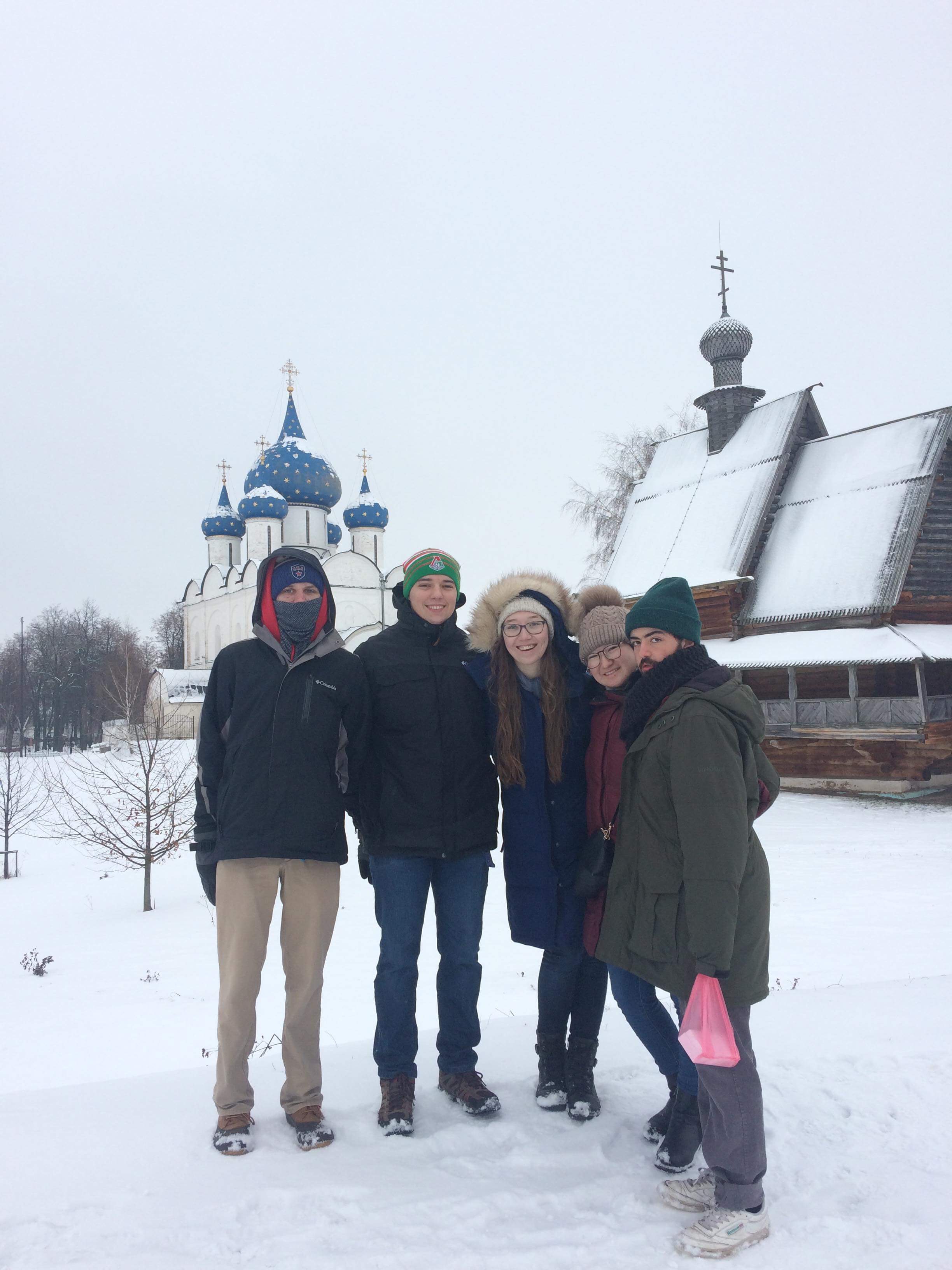Julia Isacson ’19 (center) in snowy Suzdal, Russia
Julia Isacson ‘19 is a junior Russian and Economics major. She spent summer and fall 2017 on the Dickinson-in-Moscow program. Upon her return to the U.S. in December, Julia answered some questions about her experiences abroad.
1. What was your most memorable experience?
Looking back on my experiences in Russia, I notice that my fondest memories were from our final excursion of the semester, to Suzdal and Vladimir. Vladimir was one of the first capitals of Russia, between the time of Kievan Rus’ and when the capital was moved to Moscow. The landscape and architecture of the city is very different in comparison to Moscow, with 12th century stone Orthodox churches, wooden gingerbread-like houses in preserved villages, and Christmas-like sleighs. The town has a refreshingly quiet and peaceful feeling—only two hours outside of Moscow. In Suzdal, we took a tour around the city to see the main churches and markets. In the evening, we got to experience a real banya, which is a Russian sauna where you sit in a hot wooden room and get to hit your friends with birch branch leaves while wearing crazy hats. Afterwards you run outside and roll in the snow. It’s considered by Russians to be very healthy! It was easily one of the most fun memories I have from the trip.
2. What was the biggest challenge for you?
Coming from Dickinson’s small-town, quaint campus and transitioning to a large city like Moscow was a little bit of a shock at first, but I transitioned easily within the first week. Before going abroad, I was really nervous about using the metro and public transportation. The first day my host family even drew a map of what exits to take, but the metro turned out to be one of the easiest and most efficient aspects in terms of transportation around the city. You can get almost anywhere you need very quickly and the layout is very easy to understand!
3. How was the semester program different than the summer program?
In the summer program, most of the excursions are based around Moscow, for instance visits to different museums and sights around the city, but all at a much faster pace than the semester program. During the summer program, Irina (the program director) makes sure that we see all of the main sights. Our days were packed full traveling around the city, experiencing different restaurants and cuisines, and having opportunities to tour local markets. We also took fewer classes in the summer, having about four hours of class a day: conversation, grammar, a class on Russian media and society, and a literature class.
During the semester, we took the same types of classes but at a more rigorous pace, and they were longer in duration every day. Though you do not get as much homework in Russia as you would in a Dickinson class, in class we worked very hard and covered a lot of material. During the semester program, we traveled to several different places, including Sergeev Posad, St. Petersburg, Alexander, Suzdal and Vladimir, and even took a trip to Georgia, which was the first time the program had traveled there. The semester gives students the opportunity to look at aspects of the city and culture in much more depth.
4. What advice would you give to students considering the Dickinson-in-Moscow program?
For any students who wants to study abroad, my advice would be to just go for it! There is so much to be gained and to learn from the program, and I feel like I have grown so much as a student and person throughout the experience. Though some days were not easy, there is something to be gained from every experience and I’ve made life-long memories. Russia is a gorgeous country and the Dickinson-in-Moscow program allows you to take your language skills and immerse yourself in the real world of Russian culture, art, and history.
In terms of packing to go abroad, I would try to keep everything as light as possible, but keep clothes and supplies for all types of weather, because you will experience that in Moscow! Bring a gift for your host family when you go over, such as a little token from where you come from. By the end of the program, they will feel like your true family.
